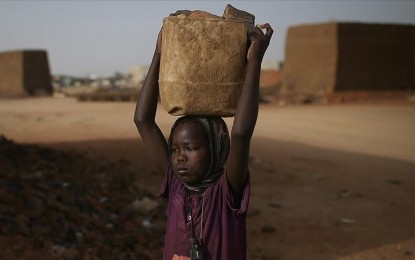
GENEVA – The United Nations International Children's Emergency Fund (UNICEF) on Tuesday said around 1 billion children worldwide are at "extremely high risk" from the consequences of climate change.
"Two-thirds of countries' climate plans don't address the needs and priorities of children," Gautam Narasimhan, a UNICEF senior adviser on climate, energy, and environment, told a press conference at the UN climate conference in Glasgow, Scotland.
Narasimhan cited a World Meteorological Organization assessment documenting how the years since 2015 have been Earth’s six warmest years on record.
"2021 is expected to be one of the warmest years on record, according to our colleagues at WMO," he added. "But while leaders are once again talking about the impact of the climate crisis on children, too few are yet to turn these words into meaningful actions that actually consider children."
Of the 103 country plans for climate change, UNICEF considers just 35 of them –about one-third – to be child-sensitive, said the UN official.
"In August, UNICEF published The Children's Climate Risk Index, which revealed that 99 percent of the world's 2.2 billion children – virtually all of them – are exposed to at least one environmental threat, including heatwaves, cyclones, flooding, drought, vector-borne diseases, air pollution, and lead poisoning," Narasimhan said.
"Roughly 1 billion children live in countries that are at ‘extremely high-risk’ of the threats of climate change. These children face multiple, compounding climate shocks, threatening their health, education, and very survival," he added.
Threat to health
Narasimhan urged a response to the climate crisis, with the interests of children at the center, and implored governments to boost investment in climate adaptation and resilience.
"Children in communities that have contributed the least to global emissions will face the greatest impacts of climate change," he said.
"These are communities that will see the greatest growth in child population over the coming decades," he added.
For those children, cutting CO2 emissions may come too late – "given (that) emissions reductions will take decades to have an impact on the climate impacts we have already baked in," the UNICEF official said. (Anadolu)
